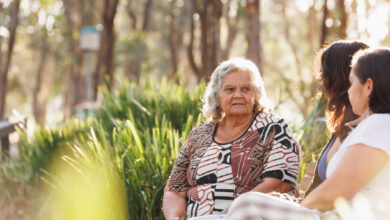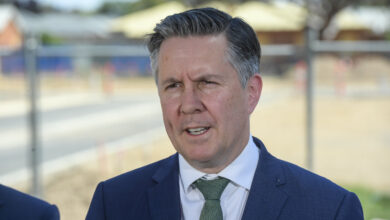Accountability concerns rise as aged care workers await wage hike

Concerns are mounting among industry experts about the government's lack of enforceable rules to ensure the pay rise funds are distributed fairly.
The Australian government committed $11.3bn over five years to fund the 15 per cent pay rise and on-costs for over 250,000 aged care workers.
But as the implementation date of July 1 draws closer, sector representatives disagree over the government's lack of concrete measures to guarantee the wages are passed on to the workers.
So far, employers are not legally obligated to distribute the government-funded pay increase to their employees.
"This lack of accountability is concerning," Charles Sturt University professor and aged care expert Maree Bernoth said.
"Taxpayers and people who care about the wellbeing of older people want to ensure the funds are actually used for those purposes.
"It's essential to value and appreciate the dedication of these workers who care for and support our vulnerable and frail older people."
The government is funding the pay rise for aged care workers through subsidies to the sector rather than directly into the workers' pockets.
This decision drew criticism from the Australian Nursing and Midwifery Federation (ANMF), which argued that relying solely on trust was 'insufficient.'
The ANMF's distrust was ignited after receiving reports from workers claiming providers were trying to lock them into new enterprise agreements (EBAs) to 'game the system.'
"As we've seen before, with no accountability mechanisms in place, the money never actually gets into workers' pockets," ANMF federal secretary Annie Butler said.
Ms Butler said she feared the 15 per cent increase on top of award rates might surpass the wages of those under enterprise bargaining agreements, potentially leaving them without the pay rise.
Although the government's assurance the funding would deliver a rise for all workers, including those earning above award rates, the ANMF raised doubts about how staff could verify this.
"The government describes this as a historic increase to award wages, but this means thousands of workers on EBAs will get nothing unless the money is tied to employers passing on the money to the workforce," Ms Butler said.
Aged care minister Anika Wells responded that the health department intended to disclose the wages paid to staff in individual aged care facilities to ensure they'd receive the increase.
Ms Wells told the Sydney Morning Herald that 'it was now law' for providers to pass on the pay rise.
She also said providers would need to demonstrate they paid workers on enterprise agreements the full rise in their quarterly financial reports from January next year.
"For people on an enterprise bargaining agreement, there is, I guess, the public pressure of transparency of this information being provided as of January 1," Ms Wells said.
Australia's primary aged care provider representative said excessive rule-setting and transparency would not be necessary.
The Aged & Community Care Providers Association (ACCPA) chief, Tom Symondson, said he was confident providers would deliver as they wanted to attract more staff.
"There's absolutely no chance providers will not increase those rates because that would be wage theft, and they'd be subject to prosecution for that," Mr Symondson said.
"Workforce is a major issue; they want to pay their workers fairly.
"They'll receive this money to pass on those rates, and they'll pass on those rates."
The government's funding will be released on June 30 and flow through different aged care models and programs.
The residential aged care funding model AN-ACC will be raised by 17.6 per cent to $243.10 per resident per day to cover the pay raises and indexation.
The new hotelling supplement replaces the daily $10 supplement, adding an extra $0.80 to deliver a rise for head chefs and cooks in aged care.
For home care packages, the value will increase by releasing $2.2bn over four years, and the Commonwealth home support grant will be raised over four years, taking up $310m.
The government is yet to release the outline of the specific amounts allocated to each worker.
"The government has pledged to fund a 15 per cent increase in the minimum rate for individuals in that category, irrespective of their current wage status," Mr Symondson said.
"But we need to see the specific details in writing to understand the exact dollar amount that each person covered by the awards should receive from their employers.
"Once the funding starts flowing from the government starting from June 30, it is expected that the corresponding pay increases will be passed on to the workers."
One of the concerns raised by the sector is the competition for nurses between the healthcare sector and aged care, with the latter offering considerably lower pay rates.
Aged care facilities in Australia are vying to hire enough nurses to meet the 24/7 nursing mandate by July 2023.
Regional aged care provider McLean Care told Aged Care Insite they had a bonus structure to meet salaries with the healthcare sector on top of paying wages above the award.
According to ANMF's calculations, entry-level registered nurses in aged care could still earn 17 per cent less than their counterparts working in public hospitals – even with a 15 per cent increase.
A starting nurse would earn $31 an hour in aged care after the pay rise compared to over $36 an hour in public hospitals.
The ANMF Victorian branch said it doubted that most nurses would even see a salary increase.
"This is because the RN and EN rates are usually more than 20 per cent above the award rates," the ANMF said.
"Under the Fair Work Act, your employer must pay you at least the award base rate.
"We need to get these increases reflected in your EBA – otherwise, they aren't enforceable – even if your employer passes the money on initially."
But Mr Symondson said that many aged care providers had already raised their employees' wages to match the public hospital rates to attract registered nurses.
He emphasised that matching those rates had played a major role in why many aged care providers are operating at a loss (63%).
"Increasing wages can contribute to the sustainability of providers by potentially reducing reliance on expensive agency staff," Mr Symondson said.
"However, there's still more work to be done to ensure the long-term sustainability of the aged care sector.
"The budget did not fully resolve the workforce crisis, but it made some positive steps in the right direction."
Email: [email protected]






Can the media please stop writing that “the Government is funding the 15% pay rise for aged care workers” because that is misleading. The Government is funidng a 15% pay rise for aged care workers for their work providing Government Funded Aged Care. However aged care workers providing private care – where Government Funding has not yet been approve/assigned for Seniors receive no increase in funding to pay for the wages increase. Further, are wages going to increase by more than 15% ie the annual increase plus the 15%? Kate Lambert, CEO, Daughterly Care
Once again not clear on who will pay the wage rise? Most of the older generation had no super, lost there partners in war , worked more than one job and where told to populate or perish so only worked to care for the children and had no benefits to help them others than themselves,hence why they are a proud generation.So I say why should they not be cared for, seems only the very rich will benefit again.